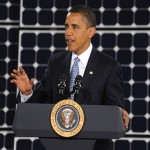President Obama devoted barely a fifth of his 5000 word long State of the Union speech to the anxious state of the world and American foreign policy. This was his seventh and final State of the Union address and he claimed that the United States of America was the most powerful country and the strongest economy in the world. He also expressed frustration that many of the domestic and foreign policy successes of his administration await approval from a bitterly partisan Congress.
Characterising the present international scenario as ‘a dangerous time’, Obama said that was not because of ‘diminished American strength’ or ‘some looming superpower.’ He said, “In today’s world, we’re (sic) threatened less by evil empires and more by failing states. The Middle East is going through a transformation that will play out for a generation, rooted in conflicts that date back millennia. Economic headwinds blow from a Chinese economy in transition. Even as their economy contracts, Russia is pouring resources to prop up Ukraine and Syria – states they see slipping away from their orbit. And the international system we built after World War II is now struggling to keep pace with this new reality.”
Obama asserted that the American foreign policy needs to “be focused on the threat from ISIL and Al Qaeda, but it can’t stop there. For even without ISIL, instability will continue for decades in many parts of the world — in the Middle East, in Afghanistan and Pakistan, in parts of Central America, Africa and Asia. Some of these places may become safe havens for new terrorist networks…”
For India, which did not figure in the speech at all, the most important element was the admission that Pakistan–was among the regions where “instability will continue for decades”. The reality is that the Taliban, with the help of Pakistan, has grown stronger despite the U.S. forces being in that country for 14 years. With Pakistani support, the Taliban attacked the Indian Mission in Mazar-e-Sharif, on January 3, marking an ominous start to this New Year.
Even more galling for India is the fact that despite rhetorical protestations of the importance of Indo-U.S. relations, the Obama administration continues to pursue a policy of equivalence between India and Pakistan. Despite admitting that Pakistan nurtures anti-Indian terrorist groups, America publicly calls on India to pursue dialogue with Pakistan – in complete contradiction to its own terrorism policy which is – “when you come after Americans, we go after you”. Worse, it privately counsels India not to retaliate against a nuclear armed Pakistan. This is another reminder that it really is up to India to decide whether it wants to be constrained by its relationship with America in policy making in its own neighbourhood.
Although Obama was dismissive of the rhetoric that America’s enemies were getting relatively stronger boasting that “The United States of America is the most powerful nation on Earth. Period. We spend more on our military than the next eight nations combined. Our troops are the finest fighting force in the history of the world.’ Despite these boasts of American strength and its success in targeting terrorists such as Osama Bin Laden abroad he was forced to admit that ‘both al Qaeda and now ISIL pose a direct threat to our people’. He claimed that having learnt the lessons of Vietnam and Iraq, America now confronts threats like the civil war in Syria with like-minded coalitions. It uses the same approach towards threats like ISIL by leading a “coalition of more than 60 countries to cut off ISIL’s financing, disrupt their plots, stop the flow of terrorist fighters, and stamp out their vicious ideology.” What this amounts to is an admission that the U.S. can no longer arrange the world according to its own interests because it is tired – as tired twenty five years after the end of Cold War as the UK and France were at the end of the Second World War.
Obama took credit for the P5 plus 1 nuclear deal with Iran claiming that ” Iran has rolled back its nuclear programme, shipped out its uranium stockpile and the world has avoided another war”. On Cuba, he called on Congress to lift the 50-year old embargo which had failed to usher in democracy. He made an implicit admission that the U.S. Congress had compromised the country’s foreign policy because despite his endeavours, he needs Congress to authorise the use of military force against ISIL, lift the embargo against Cuba and approve the Trans-Pacific Partnership agreement so that ” China doesn’t set the rules in that region, we do”.
Neelam Deo is Co-founder and Director, Gateway House: Indian Council on Global Relations; She has been the Indian Ambassador to Denmark and Ivory Coast; and former Consul General in New York.
This blog was exclusively written for Gateway House: Indian Council on Global Relations. You can read more exclusive content here.
For interview requests with the author, or for permission to republish, please contact outreach@gatewayhouse.in.
© Copyright 2016 Gateway House: Indian Council on Global Relations. All rights reserved. Any unauthorized copying or reproduction is strictly prohibited.


